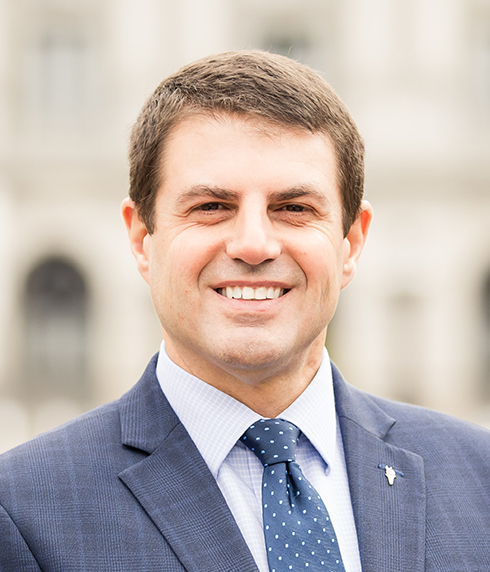Commentary

As a Former Legislator, I Know How Transformative the Taxpayer Protection Act Will Be
Those who watch the inner-workings of Pennsylvania’s politics and policies understand how difficult—and how rewarding—fiscal responsibility in state government can be. Steve Bloom, former four-term state representative from Cumberland County and now Vice President of the Commonwealth Foundation, has won numerous victories for free-market principles in the legislature. Now, he’s passionate about a new cause: the Taxpayer Protection Act (TPA).
CF: What’s the need for the TPA?
Steve Bloom: Look at our track record in Pennsylvania. From 1970 to the present, state spending in adjusted dollars has gone up astronomically. It’s an increase of $16,000 per family of four—even as the population increased! Yet nobody says the government is “so much better” after spending so much more.
After such runaway spending increases, we need to put on the brakes. The TPA simply reins in spending increases through a formula that ties any future increases to inflation and population growth. That way, natural cost increases are accounted for, but nobody can fudge those numbers into a spending bonanza.
Why does it need to be a constitutional amendment?
TPA needs to be an amendment because the pressure from constituencies with a special interest in government spending is so strong, and the impulse to grow government is so irresistible, that it’s impossible to rein in spending without a true cap.
My own constituents were conservative minded, but many pressured me to spend more on schools, programs, and social services. Then, the Capitol steps were always full of rallies for more spending: college students, teachers, farmers, social workers, environmentalists, highway beautification advocates, disability and poverty advocates. The prevailing winds always blew in the direction of spending more.
Now—these are valid, important needs! They can’t be ignored. But we need to stand in the face of those prevailing winds and redirect the conversation: how can we spend smarter with what we already have? There will always be needs that aren’t met. Limiting spending increases at least forces greater scrutiny of what we do spend.
What demand for overspending was the most difficult to approach as a fiscal conservative?
People with intellectual disabilities. Through no fault of their own, they will always be dependent on the social safety net. And with all the overspending in our state, I believe other things can be cut to continue providing these services. Still, this approach aligns with my core principles because these programs fit within government’s proper role: defense, law enforcement, infrastructure, and social safety.
If you had to describe Pennsylvania’s budget discussion in one word, what would it be?
Intense. The process consumes all legislative energy—it dominates the Capitol. Legislators get called into session more frequently as budget time approaches—from several days a week to seven days a week, including late nights, early mornings, and a crescendo as we approach the June 30th budget deadline.
What were some of the biggest difficulties that the yearly budget presented in your job?
So many times, the legislative and executive branches pushed for more spending as an end in itself. There were speeches about “getting excited about raising education spending!” and other similar rhetoric from both parties.
I decided to speak up: “With all this talk about increasing spending, why is nobody talking about where we’ll have to cut spending to make up for it? Who’s looking out for taxpayers?” This was when we had a Republican trifecta in the House, Senate, and governorship.
How did budget issues fit into your platform and focus as a candidate and legislator?
I was very passionate about the budget, fiscal responsibility, and sustainability. This was the core of my platform. By shrinking the size of government, cutting taxes and regulations, and guarding constitutional liberties, I argued that we could improve many areas by unleashing the power of the free market.
To a legislator, would the TPA feel more like an obstacle in the road or a traffic light? In other words, would tying spending limits to population and inflation be a welcome guideline?
With TPA, every legislator is still free to argue for more spending on a particular item, or even to reduce spending and reduce taxes. But once it’s law, you can have that truly important discussion: we can’t spend infinitely, so what are the priorities? Everyone knows there is waste in government. But overspending allows that waste to be masked—instead of innovating, we stagnate by taking the easy road of more debt or more taxes.
How much taxation and spending is too much, and how do we determine that?
Each state makes its own decisions. It’s a competitive exercise. We don’t make decisions in a vacuum. If we raise taxes above other states, we lose jobs and investments: did you know we lose nearly 50 people a day in Pennsylvania?
Why does that matter? Because without residents and business investment, society collapses. You can see this happening across the 50 states: there are winners and losers. We’re also in a global economy: we can lose investments and jobs to other countries. There isn’t one perfect level of taxation and spending, but because of competition, there is a self-regulatory pressure.
What’s the No. 1 argument for enacting the TPA immediately?
The TPA reflects the highest duty of elected government: to protect the taxpayers who struggle every day to put food on the table, to pay their mortgage, and to pay for their basic needs. Making sure the government doesn’t take more than its share from their hard-earned income is an act of compassion.